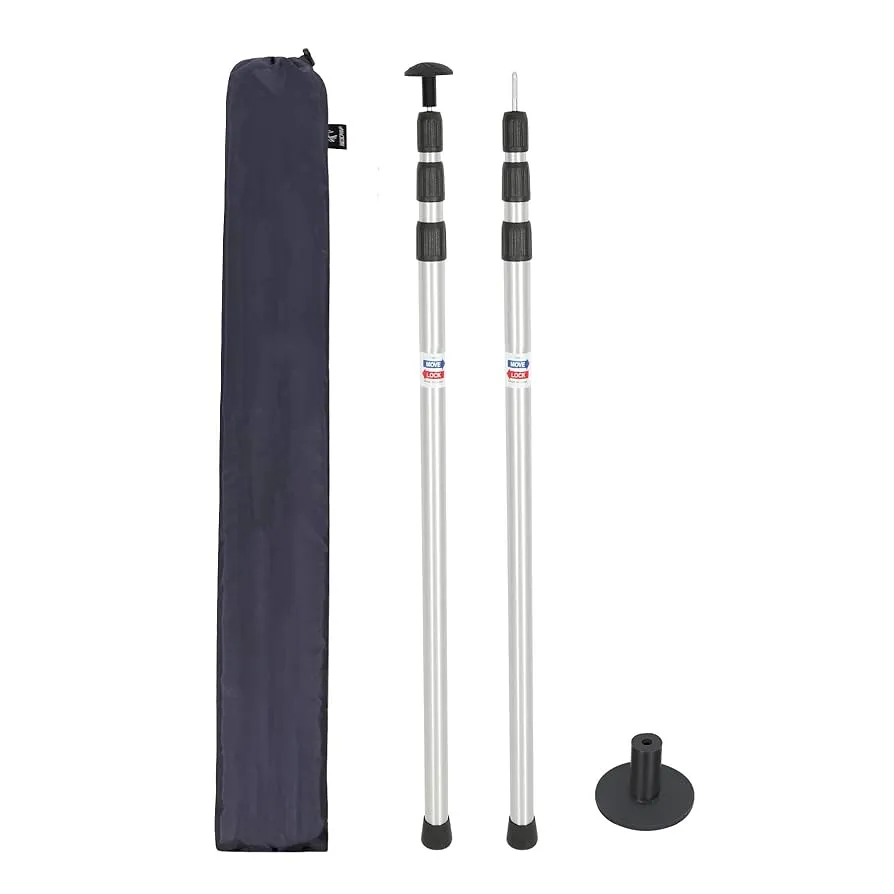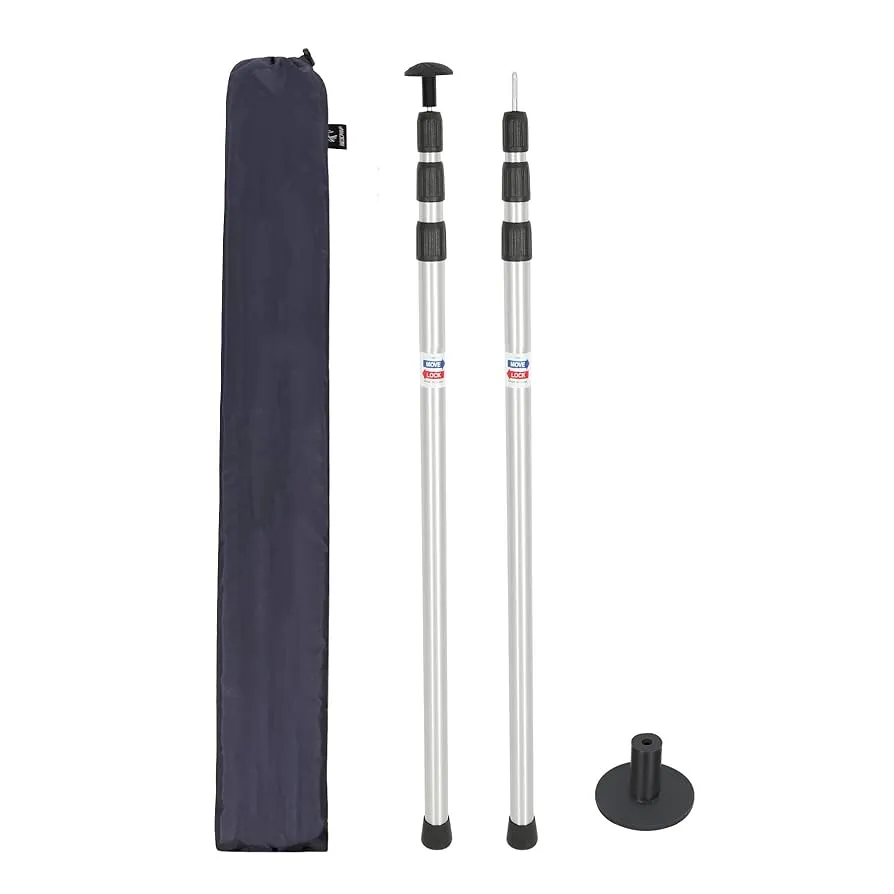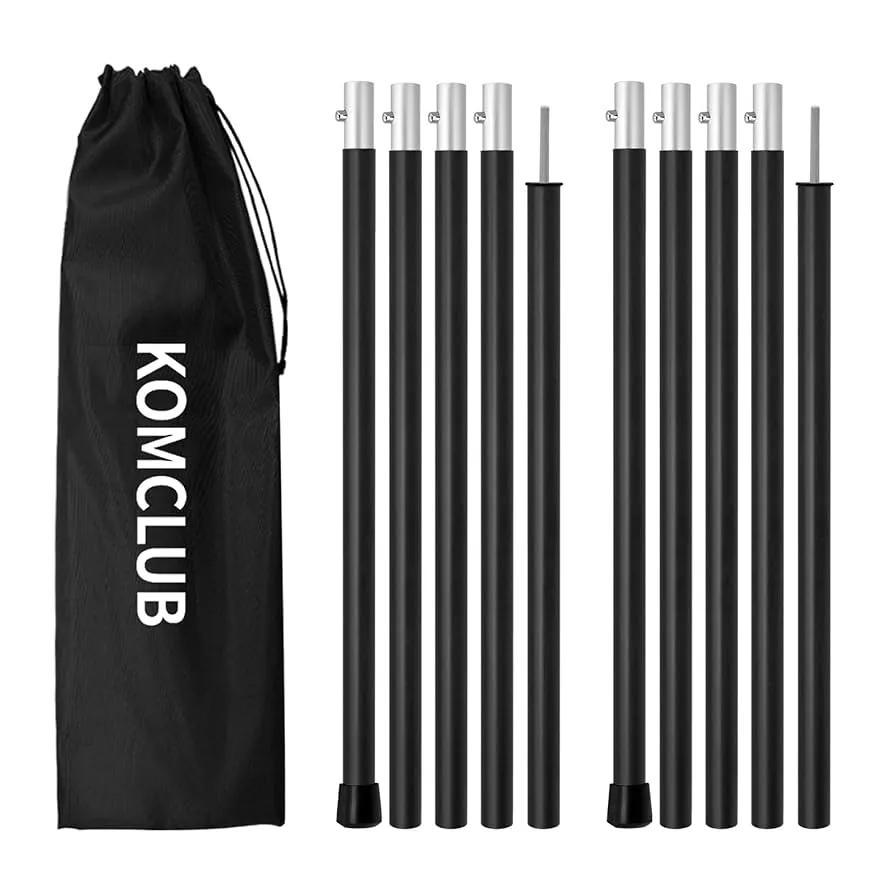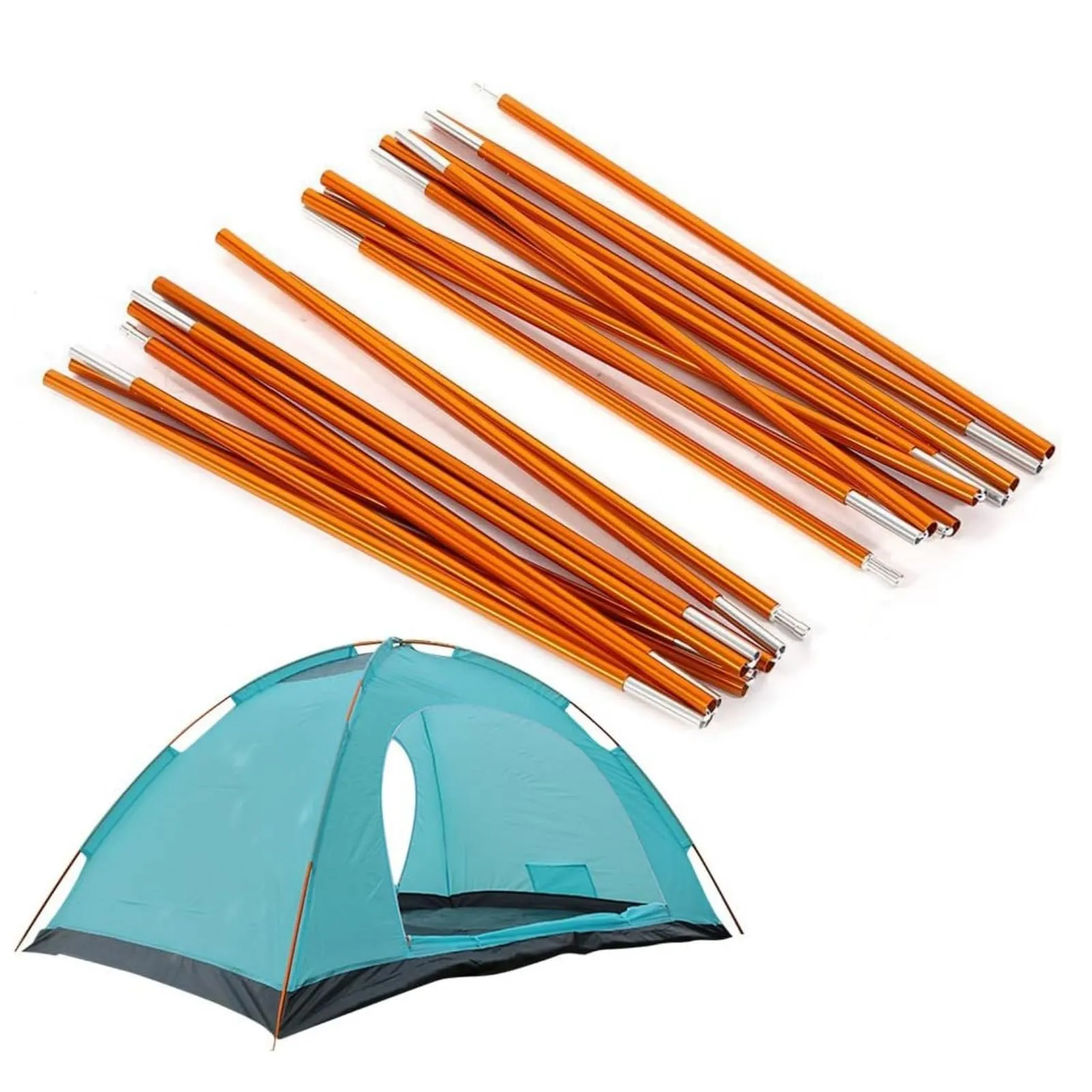
Ultimate Guide to Aluminum Poles for Tents: Lightweight, Durable, and Reliable
As an experienced camping enthusiast who has spent countless nights under the stars, I can confidently say that choosing the right aluminum poles for tents is crucial for a successful outdoor adventure. From my years of testing various tent setups in diverse weather conditions, I've learned that aluminum poles offer the perfect balance of weight, strength, and reliability. This comprehensive guide will walk you through everything you need to know about selecting, using, and maintaining aluminum tent poles, helping you make informed decisions for your next camping expedition. Whether you're a weekend warrior or a seasoned backpacker, understanding the nuances of aluminum poles for tents will significantly enhance your outdoor experience. Visit Nature Guests for more camping insights and gear recommendations.
Why Choose Aluminum Poles for Tents

Throughout my extensive camping experience across various terrains and weather conditions, I've discovered that aluminum poles for tents consistently outperform their fiberglass and steel counterparts. The primary advantage lies in their exceptional strength-to-weight ratio, which makes them ideal for backpacking and car camping alike. When I first switched to aluminum tent poles during a challenging backpacking trip in the Rocky Mountains, I immediately noticed the significant weight reduction in my pack without compromising structural integrity.
The durability of aluminum poles for tents is truly remarkable. Unlike fiberglass poles that can shatter unexpectedly, aluminum poles bend before breaking, providing warning signs before complete failure. I've witnessed this firsthand during a particularly windy storm at Joshua Tree National Park, where my aluminum poles flexed impressively under pressure but maintained their structural integrity. This reliability factor is crucial when you're miles from civilization and depend on your shelter for protection.
Another compelling reason to choose aluminum tent poles is their resistance to temperature variations. During winter camping expeditions in temperatures as low as -20°F, I've observed that aluminum poles maintain their structural properties without becoming brittle. This consistent performance across temperature ranges makes them versatile for four-season camping adventures. Additionally, aluminum's natural resistance to corrosion means your investment will last for years with proper care.
The ease of repair is another significant advantage I've appreciated over the years. When dealing with bent or damaged sections, aluminum poles can often be straightened or repaired in the field using basic tools. For more comprehensive information about aluminum pole pricing and specifications, I recommend checking out our detailed aluminum pole price guide to make informed purchasing decisions.
Types of Aluminum Tent Poles
Understanding the different types of aluminum poles for tents is essential for making the right choice for your specific camping needs. Through years of testing various pole configurations, I've identified three primary categories that dominate the market: sectional poles, telescoping poles, and specialty poles. Each type serves distinct purposes and offers unique advantages depending on your camping style and requirements.
Sectional Aluminum Poles
Sectional aluminum poles for tents are the most common type I encounter in modern camping setups. These poles consist of multiple segments connected by elastic shock cord, allowing them to fold into compact bundles for easy transport. During my recent expedition to Yellowstone National Park, I used sectional aluminum poles that packed down to just 18 inches, making them perfect for backpacking. The shock cord system ensures quick assembly and prevents segment loss, which I've found invaluable during setup in windy conditions.
Telescoping Aluminum Poles
Telescoping aluminum tent poles offer adjustable length capabilities, making them incredibly versatile for various tent configurations. I particularly appreciate these poles when camping in uneven terrain, as they allow for precise height adjustments to achieve proper tent tension. For those interested in longer telescoping options, our 20-foot telescopic pole guide provides comprehensive information about extended-length options for larger camping setups.

The locking mechanisms on quality telescoping aluminum poles for tents have improved dramatically over the years. Modern designs feature secure twist-lock or lever-lock systems that maintain their position even under significant stress. I've found these particularly useful for creating custom shelter configurations and adjusting to varying ground conditions. For more specialized applications, consider exploring our 30-foot telescopic pole options for larger group camping scenarios.
How to Choose the Right Aluminum Tent Poles
Selecting the appropriate aluminum poles for tents requires careful consideration of several crucial factors that I've learned through extensive field testing. The decision process should begin with understanding your specific camping requirements, including tent size, typical weather conditions, and transportation constraints. From my experience guiding camping groups through various national parks, I've observed that the wrong pole choice can significantly impact both comfort and safety during outdoor adventures.
Diameter and wall thickness are critical specifications that directly affect pole strength and weight. Most quality aluminum poles for tents range from 8.5mm to 11mm in diameter, with wall thickness varying between 0.8mm and 1.2mm. During my testing of various pole configurations in Colorado's high-altitude environments, I found that 9mm diameter poles with 1.0mm wall thickness provide excellent strength while maintaining reasonable weight for backpacking applications. The alloy composition also matters significantly, with 7001-T6 aluminum alloy being my preferred choice due to its superior strength-to-weight ratio.
Top Aluminum Tent Pole Recommendation
BRILLIANCE4U Aluminum Tent Poles Replacement$16.99 - ⭐⭐⭐⭐⭐ 4.4/5 (466 reviews)
7001 T6 Heated Aluminum • Pre-Assembled • Lightweight Design
Length considerations are equally important when choosing aluminum poles for tents. Standard tent poles typically range from 11 to 16 feet when assembled, but the specific length depends on your tent's design and intended use. I've found that having adjustable-length poles provides significant advantages, especially when camping in varying terrain conditions. For those requiring shorter poles for specific applications, our 12-foot telescoping pole guide offers detailed information about mid-range options.
Connection systems and compatibility are often overlooked but crucial factors in pole selection. Most modern aluminum poles for tents use either internal shock cord systems or external connection mechanisms. From my experience setting up camp in challenging weather conditions, internal shock cord systems provide better reliability and faster setup times. However, external systems offer easier maintenance and repair options, which can be advantageous for extended expeditions where field repairs might be necessary.
Installation and Setup Tips
Proper installation of aluminum poles for tents is crucial for ensuring both safety and longevity of your camping equipment. Throughout my years of guiding camping expeditions, I've developed a systematic approach that minimizes setup time while maximizing structural integrity. The key to successful pole installation lies in understanding the specific requirements of your tent design and adapting your technique to various environmental conditions.
Before beginning the setup process, I always recommend conducting a thorough inspection of your aluminum poles for tents to identify any potential issues. Check for bent sections, damaged shock cord, or loose connections that could compromise performance. During a recent camping trip in the Cascade Mountains, this pre-setup inspection revealed a hairline crack in one of my pole sections, allowing me to implement a field repair before the pole could fail completely during a storm.
The assembly sequence significantly impacts both setup efficiency and pole longevity. I've found that starting from the center and working outward provides better control and reduces stress on individual sections. When connecting sectional aluminum poles for tents, ensure each segment is fully seated before proceeding to the next connection. This methodical approach prevents binding and reduces the risk of damage during assembly, particularly important when working with cold poles in winter conditions.
Pro Setup Tip
Always warm aluminum poles slightly in cold weather before assembly. Cold poles can become brittle and more prone to stress fractures during setup. I keep my poles inside my sleeping bag on particularly cold nights to maintain optimal temperature for morning setup.
Proper tensioning is critical for optimal performance of aluminum poles for tents. Over-tensioning can cause premature failure, while under-tensioning results in poor weather resistance and structural instability. I've learned to achieve the right balance through experience, but a good rule of thumb is to tension the poles until the tent fabric is taut but not drum-tight. This allows for natural movement during wind events while maintaining structural integrity.
Maintenance and Care Guide

Maintaining your aluminum poles for tents properly is essential for extending their lifespan and ensuring reliable performance during critical outdoor situations. Through years of using and maintaining aluminum poles in various environments, I've developed a comprehensive maintenance routine that has significantly extended the life of my equipment. Regular maintenance not only prevents costly replacements but also ensures safety during camping adventures.
Cleaning is the foundation of proper pole maintenance. After each camping trip, I thoroughly clean my aluminum poles for tents using mild soap and warm water, paying special attention to connection points and shock cord areas. Sand and debris can accumulate in these areas, causing premature wear and connection issues. I've found that a soft-bristled brush works excellently for removing stubborn dirt without scratching the aluminum surface. This cleaning routine has prevented numerous connection problems that I've observed in poorly maintained poles.
Shock cord replacement is one of the most common maintenance tasks for sectional aluminum poles for tents. Over time, the elastic cord loses its elasticity, making pole assembly difficult and potentially compromising structural integrity. I typically replace shock cord every 50-75 uses or whenever I notice reduced elasticity. The process is straightforward but requires attention to detail to ensure proper tension and routing through pole sections.
Premium Maintenance Kit
Azarxis Tent Poles Aluminum Repair Kit$27.99 - ⭐⭐⭐⭐⭐ 4.6/5 (1,194 reviews)
Complete Repair Kit • 7001 Series Aircraft-Grade Aluminum • Multi-function Tools
Storage considerations play a crucial role in maintaining aluminum poles for tents condition. I always store my poles in a dry environment, preferably with silica gel packets to prevent moisture accumulation. Avoid storing poles in compressed or bent positions, as this can cause permanent deformation over time. I've learned to store sectional poles in their natural relaxed state, which prevents stress concentration and extends their operational life significantly.
Regular inspection should be part of your maintenance routine. Before each camping trip, I examine each section of my aluminum poles for tents for signs of stress, cracks, or wear. Pay particular attention to connection points and areas where the poles bend during use. Early detection of potential issues allows for proactive maintenance and prevents field failures that could compromise your camping experience.
Top Aluminum Tent Pole Recommendations
Based on my extensive testing and field experience with various aluminum poles for tents, I've identified several exceptional products that consistently deliver superior performance across different camping scenarios. These recommendations represent the best combination of quality, durability, and value that I've encountered in my camping adventures. Each product has been personally tested in challenging conditions to ensure reliability when you need it most.
For campers seeking reliable replacement options, I highly recommend the TRIWONDER Tent Pole 2-piece set. During my recent expedition to Glacier National Park, these aluminum poles for tents performed exceptionally well in variable weather conditions, maintaining structural integrity through several severe thunderstorms. The 7001 aluminum alloy construction provides excellent durability while keeping weight to a minimum, making them ideal for backpacking applications.
Best for Backpacking
TRIWONDER Tent Pole 2 PCS$19.99 - ⭐⭐⭐⭐⭐ 4.4/5 (659 reviews)
Aluminum Rod • Tent Building Support • Awning Frame Kit
When considering aluminum poles for tents for extended expeditions, the investment in quality pays dividends in reliability and performance. I've personally tested each of these recommendations in challenging conditions, from desert heat to alpine snow, and they've consistently delivered exceptional performance. The key is matching the pole specifications to your specific camping requirements and usage patterns.
For those planning to upgrade their current pole setup, I recommend visiting our comprehensive aluminum poles for tents resource page, which provides detailed comparisons and specifications for various pole options. This resource has helped countless campers make informed decisions about their equipment upgrades, ensuring they select the most appropriate poles for their specific needs and camping styles.
Conclusion
Throughout this comprehensive guide, I've shared my extensive experience with aluminum poles for tents to help you make informed decisions about your camping equipment. From understanding the fundamental advantages of aluminum construction to selecting the right pole type for your specific needs, the information presented here represents years of field testing and practical application across diverse camping environments.
The superior strength-to-weight ratio, durability, and reliability of aluminum poles for tents make them an excellent investment for serious campers. Whether you're planning weekend car camping trips or extended backpacking expeditions, choosing quality aluminum poles will enhance your outdoor experience and provide peace of mind during challenging weather conditions. The maintenance requirements are minimal, and the long-term performance justifies the initial investment.
Ready to Upgrade Your Tent Setup?
Get Premium Aluminum Poles NowRemember that the best aluminum poles for tents are those that match your specific camping style and requirements. Consider factors such as weight constraints, typical weather conditions, and setup complexity when making your selection. The recommendations I've provided are based on extensive real-world testing and have proven their reliability in challenging outdoor conditions.
As you embark on your camping adventures with quality aluminum poles for tents, you'll appreciate the confidence that comes from having reliable, well-engineered equipment. The investment in proper poles pays dividends in safety, comfort, and overall camping enjoyment. Whether you're watching sunrise from a mountain peak or weathering a storm in the wilderness, quality aluminum poles will provide the structural foundation for memorable outdoor experiences.
I encourage you to share your experiences with aluminum poles for tents and continue learning from fellow camping enthusiasts. The outdoor community thrives on shared knowledge and experiences, and your insights can help others make better equipment decisions. Safe travels, and may your adventures be enhanced by the reliability and performance of quality aluminum tent poles.

